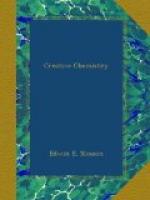But since none of the national plants could be got into action during the war, the United States was compelled to draw upon South America for its supply. The imports of Chilean saltpeter rose from half a million tons in 1914 to a million and a half in 1917. After peace was made the Department of War turned over to the Department of Agriculture its surplus of saltpeter, 150,000 tons, and it was sold to American farmers at cost, $81 a ton.
For nitrogen plays a double role in human economy. It appears like Brahma in two aspects, Vishnu the Preserver and Siva the Destroyer. Here I have been considering nitrogen in its maleficent aspect, its use in war. We now turn to its beneficent aspect, its use in peace.
III
FEEDING THE SOIL
The Great War not only starved people: it starved the land. Enough nitrogen was thrown away in some indecisive battle on the Aisne to save India from a famine. The population of Europe as a whole has not been lessened by the war, but the soil has been robbed of its power to support the population. A plant requires certain chemical elements for its growth and all of these must be within reach of its rootlets, for it will accept no substitutes. A wheat stalk in France before the war had placed at its feet nitrates from Chile, phosphates from Florida and potash from Germany. All these were shut off by the firing line and the shortage of shipping.
Out of the eighty elements only thirteen are necessary for crops. Four of these are gases: hydrogen, oxygen, nitrogen and chlorine. Five are metals: potassium, magnesium, calcium, iron and sodium. Four are non-metallic solids: carbon, sulfur, phosphorus and silicon. Three of these, hydrogen, oxygen and carbon, making up the bulk of the plant, are obtainable ad libitum from the air and water. The other ten in the form of salts are dissolved in the water that is sucked up from the soil. The quantity needed by the plant is so small and the quantity contained in the soil is so great that ordinarily we need not bother about the supply except in case of three of them. They are nitrogen, potassium and phosphorus. These would be useless or fatal to plant life in the elemental form, but fixed in neutral salt they are essential plant foods. A ton of wheat takes away from the soil about 47 pounds of nitrogen, 18 pounds of phosphoric acid and 12 pounds of potash. If then the farmer does not restore this much to his field every year he is drawing upon his capital and this must lead to bankruptcy in the long run.




